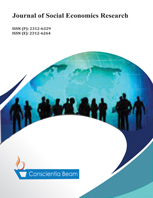Gender and global production network: De-feminization of the Indonesian apparel industry
DOI:
https://doi.org/10.18488/35.v11i2.3655Abstract
This paper aims to measure the involvement of women in the global apparel industry. This article also examines the declining role of women in the apparel industry in Indonesia, even though exports have increased. This article also aims to analyze the phenomenon of the decline of women in the Indonesian apparel industry in the last fifteen years by using survey data for medium and large enterprises conducted by Statistics Indonesia. This study uses the Fixed Effect Model's regression analysis method for panel data. The results show that the apparel industry in Indonesia in the past fifteen years has shown a downward trend, which has led to the phenomenon of de-feminization. The phenomenon of de-feminization is a term used to describe the process of the exclusion of women from specific jobs or roles in society. The results also show that this phenomenon can have a significant impact on women's economic opportunities as well as their ability to participate in the community. According to the rising number of skilled workers and rising fixed capital employed in this industry, the phenomenon of de-feminization is a result of greater mechanization and an increase in skilled workers. Indonesia has a high female workforce, so this research has practical implications; female workers need to be maximally absorbed by industry to avoid high unemployment rates based on the theory of de-feminization in developing countries.

